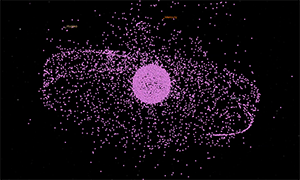
Space Situational Awareness
About
Orbital space around our Earth is congested, contested and competitive. Our research group is actively working to ensure sustainable management of this valuable resource for future generations. Our spectroscopy lab is capable of characterizing space material under space-like conditions so we can better interpret spectral properties of objects in Earth orbit and uniquely identify them. We have a dedicated telescope for collecting visible wavelength spectral data (0.35-1.0 µm) of space objects. Undergraduate engineering students built the RAPTORS telescope that will enable us to characterize objects in geostationary belt.
Projects related to small bodies include characterization of near-Earth asteroids for planetary defense, asteroid-meteorite link, rapid recovery of meteorites using radar and ground-based support for spacecraft missions. Space surveillance topics of interest include daytime imaging, telescopic and laboratory spectral characterization of space materials, sensor tasking, and cyber infrastructure for big data.
Faculty
Space Situational Awareness Faculty
Other Researchers
Space Situational Awareness Researchers

Adam Battle
R&D Software Engineer, SPACE 4 Center
Asteroid Surveys, Small Bodies, Space Situational Awareness
David Cantillo
PTYS Graduate Student
Astrobiology, Small Bodies, Space Situational Awareness
Stephen Schwartz
DCC Associate Staff Scientist (Asphaug)
Orbital Dynamics, Planetary Astronomy, Planetary Surfaces, Small Bodies, Space Situational Awareness


